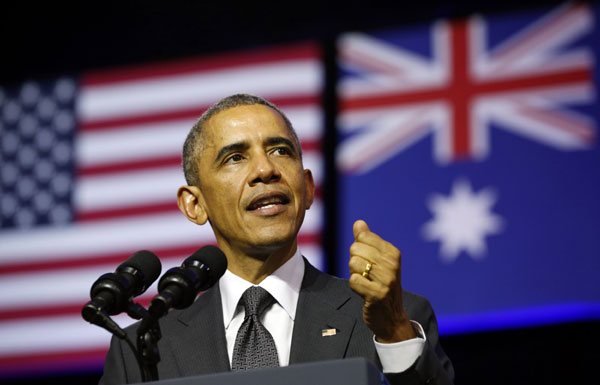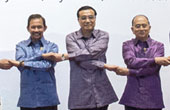Obama pledges $3b for global fund
(Agencies) Updated: 2014-11-15 13:35
 |
|
US President Barack Obama speaks at the University of Queensland in Brisbane November 15, 2014. Obama is in Brisbane for the G20 Summit being held here this weekend. [Photo/Agencies] |
BRISBANE, Australia/WASHINGTON - President Barack Obama on Friday pledged a $3 billion US contribution to an international fund to help poor countries cope with the effects of climate change, putting the issue front and centre of the G20 Leaders Summit in Australia.
The large size of the contribution took climate policy watchers by surprise and doubles what other countries had previously pledged ahead of a Nov 20 deadline. It would be the second major move on climate change taken by Obama after big Democratic losses in last week's midterm elections.
"Along with other nations that have pledged support, we'll help vulnerable communities with early-warning systems, stronger defenses against storm surges, and climate-resilient infrastructure," Obama said in remarks ahead of the official opening of the G20 summit.
"We'll help farmers plant more durable crops. We'll help developing economies reduce their carbon pollution and invest in clean energy."
The timing of the announcement was seen as putting pressure Australian Prime Minister Tony Abbott, who is hosting the summit and once described climate science as "absolute crap". Abbott had hoped the G20 summit would focus on growth and jobs.
"When most nations are saying we have to finance climate change responses, whatever Australia desires, it has to agree or it risks looking like the spoiler at what should be Australia's moment," Tim Costello, the head of World Vision Australia and the C20, or Civil Society 20, told Reuters.
Highlighing Australia's exposure to climate change, Obama said longer droughts and more wildfires were likely.
"The incredible natural glory of the Great Barrier Reef is threatened. Worldwide this past summer was the hottest on record. No nation is immune and every nation has a responsibility to do its part."
The Green Climate Fund will work with private sector investment and help spur global markets in clean energy technologies, creating opportunities for entrepreneurs and manufacturers including those from the United States.
"The fund will be able to deploy innovative instruments. That is the key distinguishing characteristic of the GCF; it has the opportunity to mobilize significant flows of private capital," Abyd Karmali, managing director of climate finance at Bank of America Merrill Lynch.
Rich countries had pledged in 2009 to mobilize $100 billion a year by 2020 to help developing countries tackle carbon emissions.
In the run-up to the global climate talks in Paris next year, developing nations view finance as a vital part of any deal.
Hela Cheikhrouhou, executive director of the fund, lauded the US pledge as a game-changer. "It could have a domino effect on all other contributions," she said.
The US pledge roughly doubles the $3 billion already promised for the fund, which will hold a first donors' meeting in Berlin on Thursday.
Germany and France had earlier pledged $1 billion each, and Mexico, South Korea, Japan and others have pledged smaller amounts.
The UN has set an informal goal of raising $10 billion for the fund before a meeting of environment ministers in Peru, next month. Developing nations have been urging $15 billion.
Some environmentalists were unimpressed by the pledge. Friends of the Earth said $3 billion "falls magnitudes below what is actually needed by developing countries."










